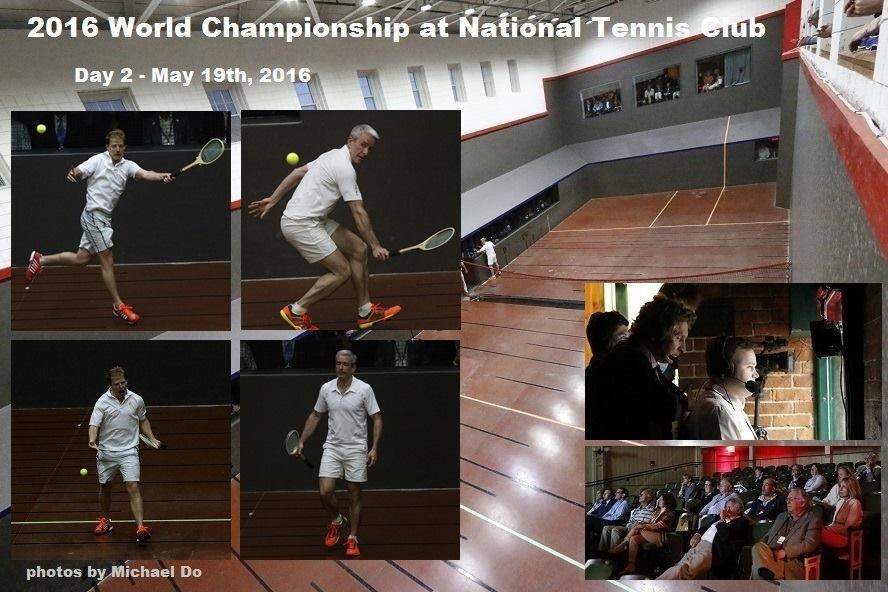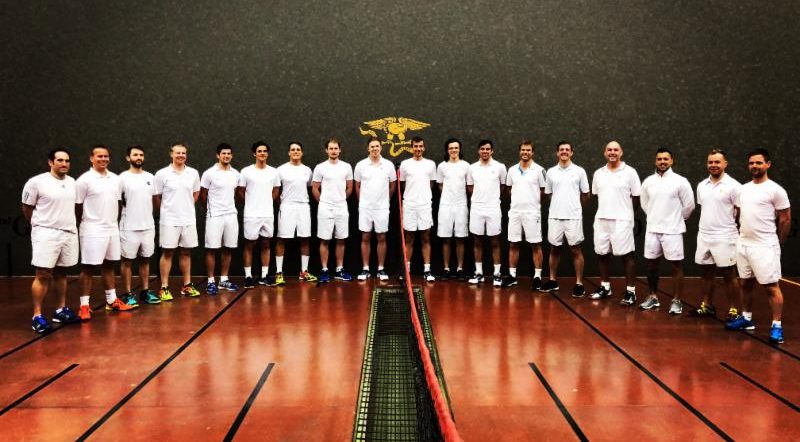The Second Day
By James Zug
The crucial moment, perhaps, in the day’s play and in the 2016 world championship in general, came in the eighth set. It was 3-3. Rob Fahey had taken the previous, seventh set and now had roared back from a 1-3 deficit. He was up 40-0. He was on the verge of pushing through and squaring the day at two-sets all. Thus, the overall score would be 5-3, and the final day of play on Saturday would be promising or at least realistically possible, with a tiny bit of margin of error and Fahey needing to win four sets out of an available five.
Instead, in an instant, Riviere closed the set out. He captured nine points in a row and thirteen of the next fourteen. It was a remarkable denouement to a remarkable three hours of play.
The thought on the second day was perhaps Fahey, having never lost a day’s play at a world championship before, could marshal his decades of experience and turn the tables. The second-day balls would take more cut, enabling both Fahey’s famous railroad to cling tighter to the walls and his famous cut volley off the serve to die in the right corner like a butterfly with sore legs landing on a flower.
But the court was a bit warmer—the sunny, temperate Newport weather continued to hold but it was a few degrees hotter and more humid—and Fahey had trouble reading the bounce of the ball. He made many forced and unforced errors. He looked uncomfortable and frustrated. He repeatedly asked the marker, Drew Lyons, to announce the score again. He dropped his racquet. He took his right sneaker off at a change-over. He smacked himself with his racquet. “There’s a back wall here—how long have you played,” he asked himself out loud after a Riviere groundstroke forced him to backpedal until he ticked the back wall with his swing. Later he asked the crowd in the dedans, “Anyone want to sub in for me?”
Most of Fahey’s failures could be attributed to the tremendous pressure Riviere was placing him in, time after time. After a first day of stunning retrieving, Riviere looked even fresher. He jackrabbited around the court, fetching ball after ungettable ball. Often he was so quick that he arrived in time to set his feet and calmly stroke his response. From the hazard side, he feathered balls down the line to Fahey’s backhand, and Fahey, pinioned in the corner, was then unable to shoot for the winning gallery or even the grille. The points were often long, Riviere content to play the floor, and when Fahey forced or boasted, his speedy, cat-burgler feet were more than equal to the task as he managed to reach and deflect most of them. Very often, Fahey was desperately hunting down Riviere’s shots and could only pop up high floating responses.
Riviere took the first two sets of the day at 6-2. Some of the games were close, but Riviere clearly dictated the play. Fahey had the better statistics, perhaps, fifteen galleries total to Riviere’s four and an equal number of winning galleries and grilles, but Riviere was the better player.
In the third set of the day, Fahey set back the clock. He had time to slap ten galleries and while in the first two sets he had forced just three balls into the dedans, in the third he rifled six. His energy was up. He ended rallies. Like on the first day, the third set featured an epic sixth game. Fahey saved a half dozen game points. Even though he lost the game, Fahey showed fight and determination and took the next three games to clinch the set 6-3.
In the last set, Fahey went down 3-1 and climbed back to even it, at one point sending a surface-to-air missile into the dedan to beat a chase of one and two. But on the verge of taking the crucial seventh game of the set, Fahey suddenly disappeared under a barrage of what is now vintage Riviere shotmaking. It was a microcosm of the match. Riviere dug a ball out of the corner enough to get it barely over the net to win a chase (Fahey dropped his racquet in disbelief); twice in a row he drove a backhand so low below the grille Fahey couldn’t return it; Fahey then twice missed main wall forces off the serve and Riviere placed the first one into the grille and the second skimming below to the winning gallery side, ungettable. Within the space of ninety seconds, the lead had evaporated. In the next two games, Riviere rode the late-breaking wave of brilliance. He cracked a short boast and Fahey was unable to come forward fast enough to return it. He spun railroads that were too tight. And on the last point of the day he covered a boasted force and not only did he cover it but he crunched it directly into the grille for an emphatic finish.
Riviere won three sets, Fahey won one: 6-2, 6-2, 3-6, 6-3. Riviere leads the world championship six sets to two



